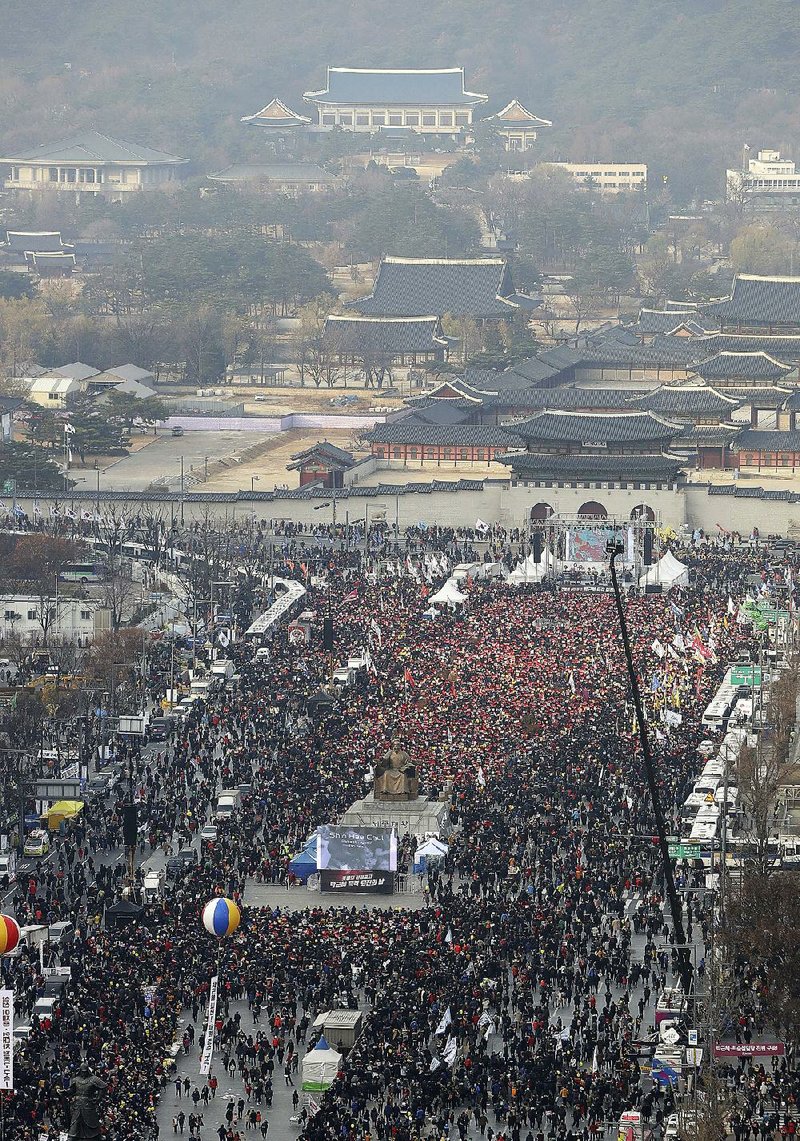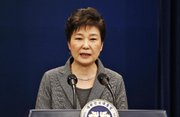SEOUL, South Korea -- Rallying for the sixth-straight weekend, hundreds of thousands of demonstrators in Seoul got the closest yet Saturday to the president whose impeachment lawmakers are set to consider this week.
The demonstration came hours after lawmakers formally began an attempt to impeach President Park Geun-hye and set up a floor vote for as early as Friday. State prosecutors accuse Park of helping a close confidante extort money and favors from large companies and manipulate state affairs.
The scandal has sparked protests each Saturday in downtown Seoul. In the latest demonstration, the protesters advanced to a narrow alley about 100 yards away from the presidential palace grounds, an area police didn't previously permit them to enter.
Police estimated the turnout at 320,000, making it the biggest anti-Park rally so far, though the crowd appeared to be much larger. Protest organizers estimated the crowd at 1.7 million.
Some of the demonstrators, led by the relatives of the 2014 Sewol ferry disaster that killed more than 300 people, mostly teenagers on a school trip, jammed the alley near the presidential office, shouting for hours to demand Park's arrest, not just her resignation.
Some protesters angrily threw flowers at police who had created tight perimeters around the street, and demanded that the officers get out of the way.
"We not once were allowed on this street ... I have long dreamed of the day I stand here with citizens," said Jeon Myeon-seon, one of the parents of the teenagers who died in the ferry disaster, which was partially blamed on government incompetence and corruption. "We will continue to join this fight with our fellow citizens until the full truth is out on how this government defrauded its people."
Thousands also rallied near the National Assembly to pressure political parties, including Park's conservative ruling party, to vote for her impeachment this week.
Opposition parties controlling South Korea's parliament had planned to call for a vote last week, but were thrown off after Park made a conditional offer Tuesday to leave office, which left them debating the timing.
Park's overture also has caused cracks among dissenters in her conservative ruling party who had earlier backed her impeachment, an alarming development for opposition parties, which don't have enough votes to push through the impeachment motion themselves.
"I am full of anger, but also worried," said Ray Kim, an out-of-towner who participated in the Seoul protests for a second-consecutive week. "It would leave a terrible historical example if millions protested for weeks against a crime-committing president but she was able to shake it off."
early-morning motion
Opposition parties waited until after the end of the week's plenary session to register an impeachment motion at 4:10 a.m. Saturday.
The motion has the support of all 171 lawmakers from the three opposition parties and independents, excluding the parliamentary speaker. The opposition will need the support of dissenters from Park's ruling Saenuri Party to achieve the 200 votes it needs to pass an impeachment bill.
Kang Sun-a, deputy spokesman at the Democratic Party of Korea, said by phone that the motion will officially be proposed during a regular parliamentary session Thursday, with the vote to be held Friday.
The motion accuses Park of violating the constitution and undermining democracy by allowing her longtime friend Choi Soon-sil to interfere in state affairs, and letting senior presidential aides help Choi extort from companies.
It also accuses Park of other crimes, including abuse of authority, coercion and bribery, over allegations that large companies were bullied or offered rewards for giving money and favors to foundations and businesses Choi controlled.
Park has denied allegations of bribery, saying she has never sought personal interests during her government service. Regarding the criticisms on her responsibility in the Sewol disaster, the presidential Blue House website's fact-checking sections say Park carried out her official duties mostly in a private office at her residence and ordered directives by phone. An official at the Blue House declined to comment on allegations cited in the impeachment motion.
Some anti-Park lawmakers in the ruling party have called for Park to announce by Wednesday that she will step down voluntarily in April. It's uncertain whether they will back the impeachment bill if she does.
Park said Tuesday that she would leave office if parliament comes up with a stable power transfer plan, though she didn't provide a timeline. Opposition lawmakers criticized the overture, saying it was a stalling ploy aimed at luring back members of her party who supported impeachment.
If the parliament approves the impeachment motion, Park will be suspended from power immediately and the prime minister will take over. The final ruling of the impeachment process has to be made by the Constitutional Court within 180 days, and needs at least six of nine judges' approval that the impeachment abides by Korea's constitution.
Information for this article was contributed by Kim Tong-Hyung of The Associated Press and by Sohee Kim of Bloomberg News.
A Section on 12/04/2016


